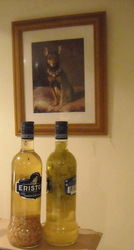Update on the elderflower vodka
Posted by Fiona Nevile in Fruit, Liqueurs | 13 commentsI had a sip or two of our elderflower vodka a couple of days ago. The flavour has improved and mellowed a bit. Unlike TCL’s – it’s drinkable – just. It has good notes when you open the bottle and sniff but the waft promises loads more than the grog actually presents. There is no trace of that early summer elderflower cordial zing. It might be the sort of shot that you’d be given to settle your metabolism and clean the blood.
Faintly herbal, this elderflower vodka will never shine as a star in our cellar. We have three litres of this grog – my optimism sadly knew no bounds.
Instinct says.
“Throw this away. Put it down to experience. Why throw good fruit after bad?”
Instinct encouraged me to invest in three litres of vodka so I’m not following Instinct’s advice when it comes to homemade grog.
I decided to embark on major tinkering. I added 350g of freshly plucked home grown gooseberries and 100g of sugar to 75ml of elderflower vodka. Hoping that this would modulate the medicinal tongue cleaning aftertaste. After a few good shakes the vodka smelt far better and much more promising. Two days later this gooseberry vodka is tasting good. It will need more sugar in time.
I also had 300g of white currants to hand. Home grown too and missed by the birds. I added these to 75ml of elderflower vodka and bunged in 30g of sugar. That is the bottle on the left – the one with the ‘frogspawn’ effect at the base. This is also doing well – the slight sharpness of the white currants is working.
Perhaps the hint of elderflower will make these concoctions superb? Only time will tell.
Now I have just 1.5 litres of the elderflower vodka left. I’m going to keep a bit back to see how it develops – it could be great in a few months time. Meanwhile I reckon that hulled strawberries or wild mountain strawberries could be a good partner with the remaining 75ml.
Perhaps these are the first faltering steps to becoming a master blender!
Leave a reply






I’m not sure why you’re not getting a very pleasant “spring in a glass” liqueur – possibly you over did the elderflowers. This is the recipe that worked for me last year:
6-8x elderflower heads
1x sliced lemon
70 cl vodka (I’ll try gin another time)
300 ml water
200 ml white sugar
Strip the flowers from the heads and place into your steeping jar. Use the slices of lemon to ballast down the flowers, and gently pour over the alcohol.
I left mine steeping for two weeks in the dark. The very top layer of the flowers did discolour slightly, but using the lemon slices to ballast it helped.
Make up a sugar syrup using the sugar and water. Strain the elderflowers and lemon slices from the alcohol. Add the sugar syrup and bottle. I gave the lemon slices a slight squeeze to release some of the juice.
It’s very, very nice. A light and refreshing liqueur. One to make again.
To extract alcohol you may try deep freeze in plastic lemonade bottles. The watery bit freezes and the alcohol is poured off. You can use this to increase the alcohol in for example raisin wine.
A word of caution – don’t want to be a killjoy BUT – home spirit distilling is not legal in the UK unless you have a customs and excise (or HMRC as it is now)licence to distil.
In my experience of playing (sorry working) with alcohol, adding other things as Fiona has done , most times gets you out of a jam. The vanilla trick also works well as vanilla is one of those univeral tastes that everyone loves so we tend to forgive the undertones and concentrate on the vanilla flavour.
Tanya, your tip sounds great! I would have never thought of vanilla pods… Thanks for the idea!
If you have any bottles left, you could try throwing two split vanilla pods in and setting it in a warm window sill for a couple of weeks. Vanilla cures all 🙂
Wonderful idea! I have never tried modifying the vodkas/gins which don’t give satisfactory results… Maybe I should? It’s a pity to throw them away. I shall think about the possible transformation of my rhubarb gin and peach vodka (both turned out awful).
I am now making a very promising black currant vodka and the aroma is irresistible… I feel this one will be the best of my home-made liquors.
…or you could always dab a little behind your ears!
you could try reclaiming the vodka by pouring it all into a pressure cooker with a length of plastic tubing attached to the weight vent. leading into a bottle stood in a container of cold water! bring to the boil and see what happens! – sort of mini-distillation plant!
Rollo and his friends (University students)have kindly offered to take the Elderflower brew off my hands. I may though go for Fiona’s suggestion of adding cherries to it. At the moment it is simply Vile.
Do you perhaps mean 750ml or 75dl? 75ml is less than half a cup…
As much as I hate being pedantic, your bottles in the photo are clearly bigger than 75ml!
Nil desperandum, Fiona!…(and never waste grog!) Let us know the result.